DoorDash Bundle
Who Really Calls the Shots at DoorDash?
Understanding the DoorDash SWOT Analysis is crucial, but have you ever wondered who truly steers the ship of this delivery giant? DoorDash's journey from a startup to a market leader is a fascinating tale of ownership evolution. From its inception to its transformative IPO, the company's ownership structure has dramatically shaped its trajectory.
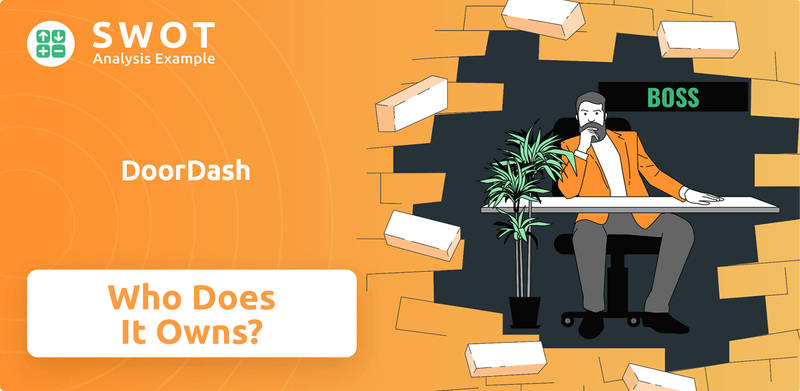
The shift in DoorDash's ownership, especially after its IPO, has had a profound impact on its strategic direction and accountability. This exploration will examine the key players in DoorDash's ownership, including its founders, early investors, and current major shareholders. We'll also look at the influence of DoorDash executives and the impact of its funding rounds on its growth and governance, providing insights into the company's future.
Who Founded DoorDash?
The story of DoorDash begins with its founders, a group of Stanford University students who identified a need in the local business landscape. Tony Xu, Andy Fang, Stanley Tang, and Evan Moore launched the company in 2013, initially under the name PaloAltoDelivery.com. This venture was born out of their observation of the delivery challenges faced by local businesses.
Tony Xu, the current CEO, brought a personal touch to the venture, influenced by his family's experiences with small businesses. This early focus on supporting local enterprises set the stage for DoorDash's future growth. The company's initial funding and early investment rounds shaped its ownership structure and trajectory.
DoorDash's early success was fueled by strategic investments and a growing user base. The founders' vision and execution attracted significant attention from venture capitalists and other investors, which helped the company scale up quickly.
DoorDash was founded in 2013 by Tony Xu, Andy Fang, Stanley Tang, and Evan Moore. They started with PaloAltoDelivery.com, focusing on local deliveries.
The company received $120,000 in seed money from Y Combinator in exchange for a 7% stake. This early funding was crucial for DoorDash's initial growth.
Early investors included Sequoia, Khosla Ventures, Kleiner Perkins, and Charles River Ventures. These firms played a key role in DoorDash's early financial backing.
Evan Moore, one of the co-founders, left the company in 2014 after 17 months. This marked an early shift in the company's leadership.
A $535 million funding round led by SoftBank in March 2018 valued DoorDash at $1.4 billion. This was a significant milestone in DoorDash's funding history.
Prior to the IPO, Tony Xu held a 4.4% stake, and Andy Fang and Stanley Tang each held 4%. This illustrates the dilution that occurred through multiple funding rounds.
The evolution of DoorDash ownership reflects its growth trajectory, with early investors and subsequent funding rounds shaping the company's structure. SoftBank's investment, for instance, resulted in significant dilution for the founders. As of November 2020, SoftBank was the largest shareholder with an 18.6% stake, followed by Sequoia with 15.3%. The DoorDash IPO further changed the DoorDash ownership structure explained. For more details, you can explore the Revenue Streams & Business Model of DoorDash. The company's journey from a startup to a publicly traded entity demonstrates the dynamic nature of DoorDash investors and the broader food delivery market.
DoorDash's early ownership involved founders and venture capital firms. The company's valuation increased significantly through multiple funding rounds.
- Founded by Tony Xu, Andy Fang, Stanley Tang, and Evan Moore.
- Y Combinator provided initial seed funding.
- SoftBank became a major shareholder.
- Founder ownership diluted over time.
DoorDash SWOT Analysis
- Complete SWOT Breakdown
- Fully Customizable
- Editable in Excel & Word
- Professional Formatting
- Investor-Ready Format
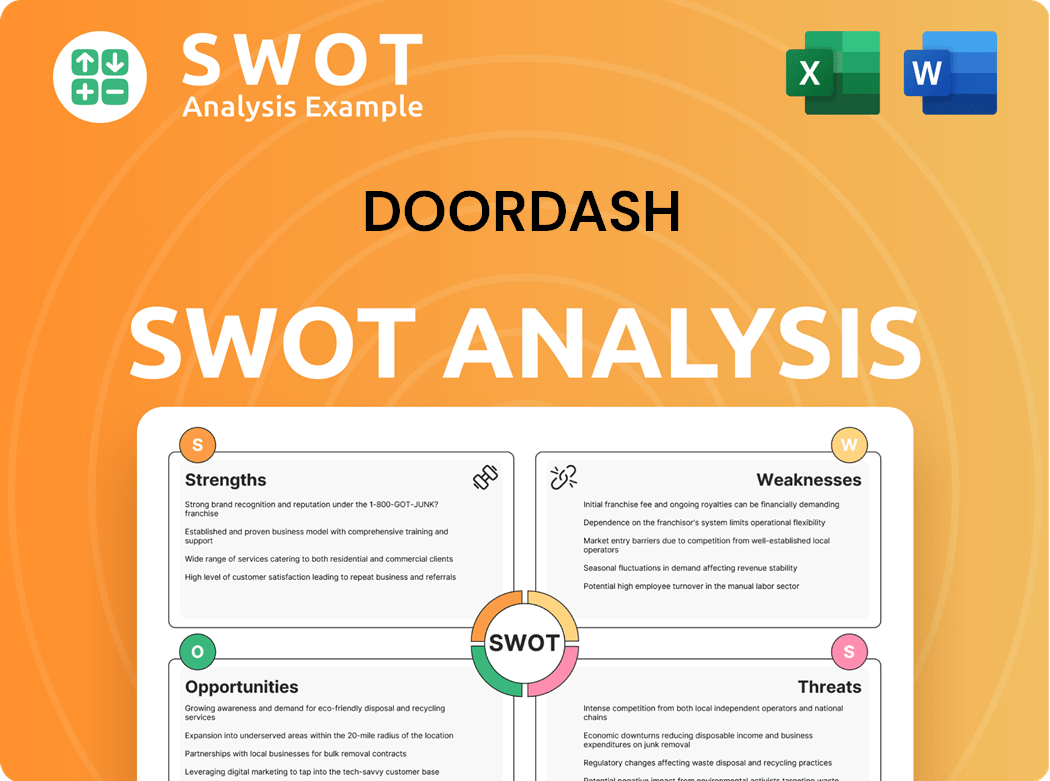
How Has DoorDash’s Ownership Changed Over Time?
The evolution of DoorDash's brief history is marked by its Initial Public Offering (IPO) on December 9, 2020. This pivotal event transformed the company's ownership structure, introducing it to the public market. The IPO, priced at $102 per share, saw the company's shares begin trading on the New York Stock Exchange under the ticker symbol 'DASH'. The initial market capitalization quickly rose to over $60 billion on a fully diluted basis, reflecting strong investor confidence in the company's growth potential.
DoorDash's ownership structure is characterized by a multi-class share system. This system includes Class A common stock, Class B common stock, and Class C common stock. The Class B shares, which hold a significant voting advantage, were primarily held by the co-founders, Tony Xu, Andy Fang, and Stanley Tang, at the time of the IPO. This structure has allowed the founders to maintain considerable control over the company's strategic decisions, even as the company has grown and attracted more investors. As of June 12, 2025, DoorDash's market capitalization has increased to $91.78 billion, illustrating the continued interest and investment in the company.
| Key Event | Date | Impact on Ownership |
|---|---|---|
| Initial Public Offering (IPO) | December 9, 2020 | Transitioned from private to public ownership; introduced Class A shares. |
| Shareholder Meetings | Ongoing | Shareholders vote on key decisions, influencing company direction. |
| Secondary Offerings | Various Dates | Further diluted founder ownership, increased public float. |
The concentrated voting power held by DoorDash executives, particularly the co-founders, is a key aspect of the company's ownership. As of December 31, 2022, the co-founders held 61% of the voting power. Tony Xu, as of December 2020, held 69% of the voting interest. This structure allows the founders to retain substantial influence over strategic decisions. Major institutional investors and mutual funds hold Class A shares, but their voting power is significantly less than that of the founders. Understanding the DoorDash ownership structure is crucial for anyone looking to understand the company's trajectory and the influence of its major stakeholders.
DoorDash's ownership structure is complex, featuring a multi-class share system that grants significant control to the founders.
- The IPO in December 2020 was a pivotal moment, transforming the company from private to public.
- The co-founders, through their Class B shares, maintain considerable voting power.
- Major institutional investors hold Class A shares, but their voting rights are limited compared to the founders.
- As of June 12, 2025, the market capitalization of DoorDash is $91.78 billion.
DoorDash PESTLE Analysis
- Covers All 6 PESTLE Categories
- No Research Needed – Save Hours of Work
- Built by Experts, Trusted by Consultants
- Instant Download, Ready to Use
- 100% Editable, Fully Customizable
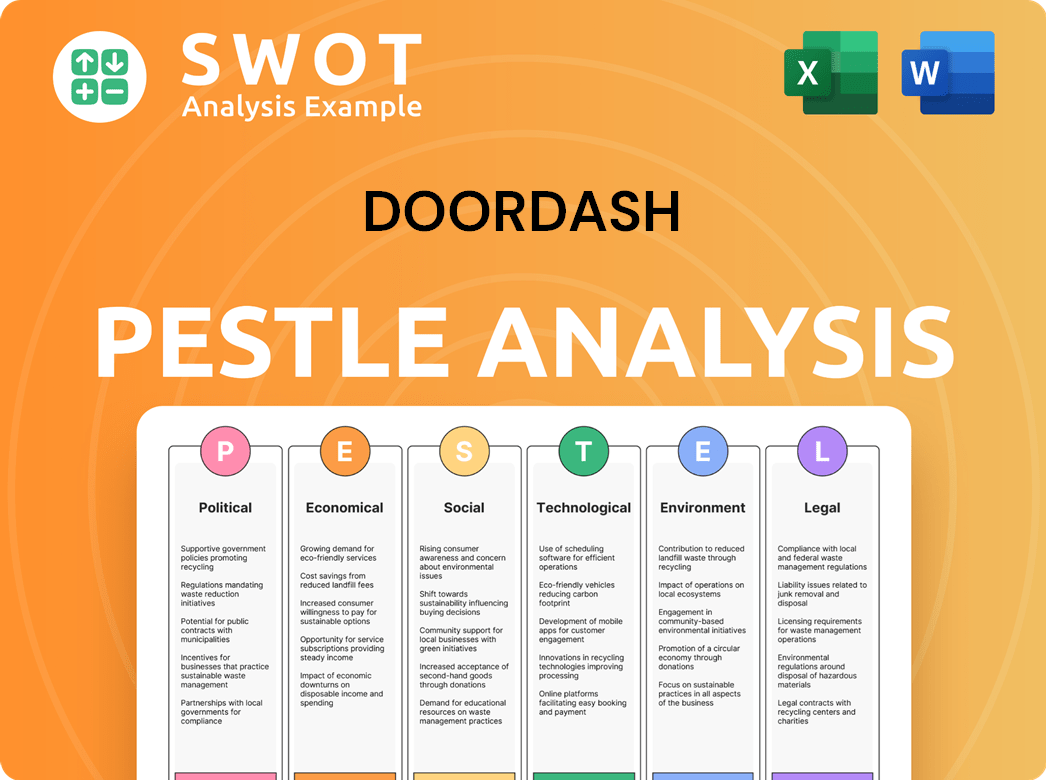
Who Sits on DoorDash’s Board?
The current board of directors at DoorDash is significantly influenced by the company's ownership structure, particularly due to its multi-class share system. The board is classified into three classes, with only one class of directors elected each year for staggered three-year terms. This structure, combined with dual-class shares, restricts the immediate impact of public shareholders on board elections. Understanding the intricacies of DoorDash ownership is crucial for anyone looking into the company's operations.
DoorDash's board members and their influence are closely tied to the different classes of stock. This arrangement gives the co-founders significant voting power. This concentration of voting power has drawn scrutiny from investor groups. The structure of the board and the voting rights are key aspects of understanding the company's governance.
| Board Member | Title | Affiliation |
|---|---|---|
| Tony Xu | Chairman & CEO | DoorDash |
| Andy Fang | Head of Consumer Engineering | DoorDash |
| Stanley Tang | Head of DoorDash Labs | DoorDash |
| Gokul Rajaram | Board Member | DoorDash |
| Keith Rabois | Board Member | DoorDash |
The co-founders, Tony Xu, Andy Fang, and Stanley Tang, hold a significant portion of the voting power. This control is further solidified by a voting agreement giving Tony Xu the authority to direct the vote of their Class B shares. This setup allows Xu to effectively control decisions requiring stockholder approval. For more insights into the company's strategic moves, consider reading about the Growth Strategy of DoorDash.
DoorDash's board is structured to give founders significant control. The dual-class share system concentrates voting power with the co-founders. This structure has drawn scrutiny from investor groups, focusing on accountability.
- The board is classified, with staggered terms.
- Class B shares held by founders have 20 votes per share.
- Tony Xu has voting control over other founders' shares.
- Activist investors have raised concerns about the structure.
DoorDash Business Model Canvas
- Complete 9-Block Business Model Canvas
- Effortlessly Communicate Your Business Strategy
- Investor-Ready BMC Format
- 100% Editable and Customizable
- Clear and Structured Layout
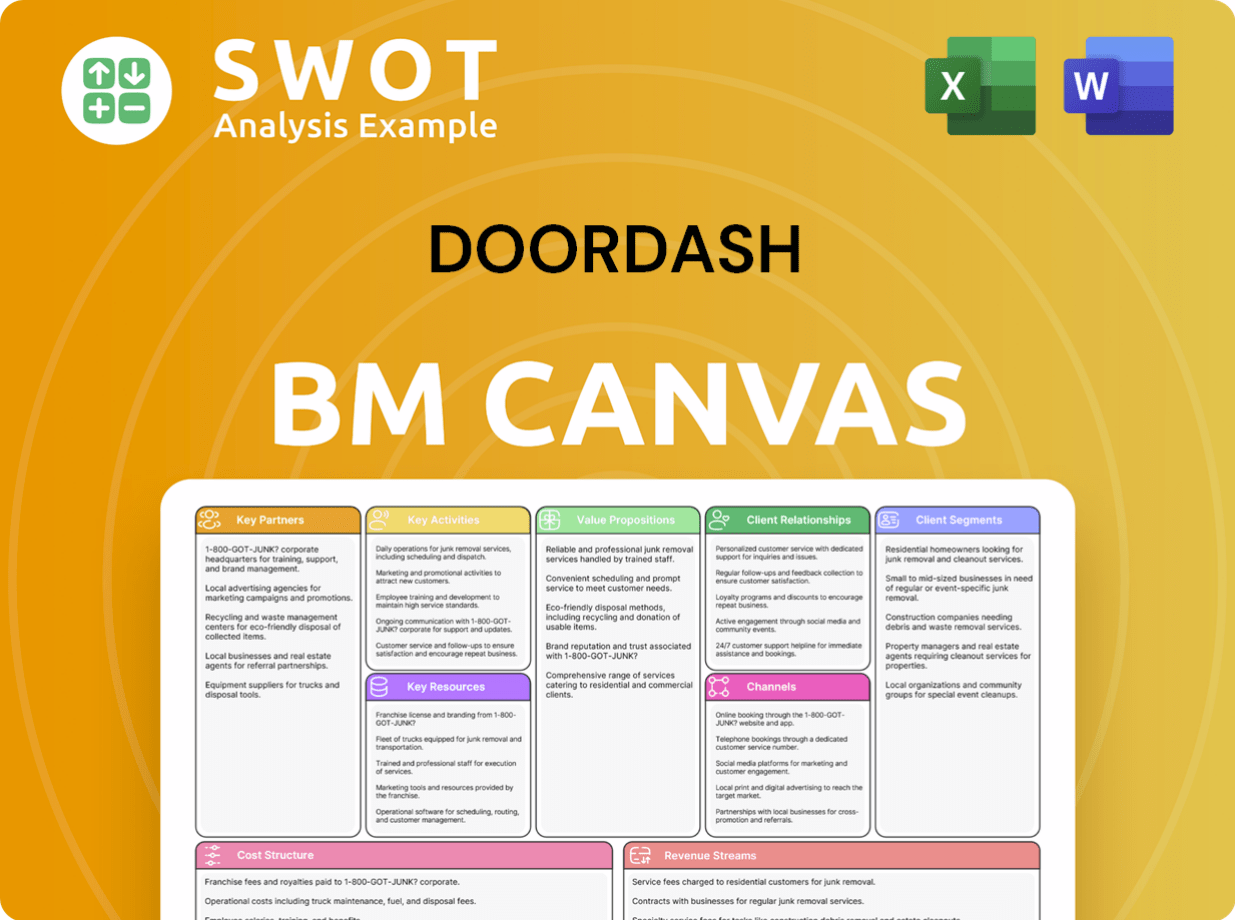
What Recent Changes Have Shaped DoorDash’s Ownership Landscape?
In recent years, DoorDash has actively managed its ownership structure through share repurchases. In February 2025, the board authorized the repurchase of up to $5.0 billion of its Class A common stock, including the remaining $876 million from a previous authorization. During 2024, the company repurchased approximately 2.1 million shares for $224 million. These actions are aimed at potentially increasing the ownership percentage for existing shareholders.
DoorDash's strategic moves also include mergers and acquisitions. In May 2025, the company agreed to acquire SevenRooms Inc. Additionally, there was a proposed offer to acquire Deliveroo plc. These acquisitions are part of DoorDash's strategy to expand its global presence and enhance its B2B platform. These strategic moves influence the dynamics of DoorDash ownership and its future direction.
| Metric | Value | Year |
|---|---|---|
| Share Repurchase Authorization | $5.0 billion | February 2025 |
| Shares Repurchased in 2024 | 2.1 million | 2024 |
| Share Repurchase Cost in 2024 | $224 million | 2024 |
| Deliveroo Acquisition Offer | £2.9 billion | May 2025 |
The leadership of DoorDash, with CEO Tony Xu at the helm, continues to shape the company's trajectory. While the founders' economic ownership has seen some dilution due to funding rounds and the IPO, their voting power remains significant. This structure helps maintain control over strategic decisions. Furthermore, the company regularly communicates its financial performance, such as the Q1 2025 earnings call on May 6, 2025, which reported record quarterly results. Also, the company announced a proposed private offering of $2.0 billion of convertible senior notes in May 2025.
The ownership structure of DoorDash involves a dual-class structure, with Class B shares holding more voting power. This arrangement allows founders to retain control even as the company grows and attracts more investors. Understanding this structure is key to grasping the dynamics of DoorDash's growth strategy.
Major shareholders include institutional investors and the founders, who wield significant voting power. The company's financial backers have played a crucial role in its expansion. The dual-class structure influences how these shareholders impact corporate governance.
Share repurchase programs and convertible senior notes offerings impact the company's capital structure. These activities influence the ownership percentages and financial health of the company. These financial maneuvers are crucial for maintaining investor confidence.
DoorDash continues to evolve its ownership profile through strategic acquisitions and financial maneuvers. The company's actions are geared towards expanding its market presence and strengthening its financial position. The company's future depends on these strategic decisions.
DoorDash Porter's Five Forces Analysis
- Covers All 5 Competitive Forces in Detail
- Structured for Consultants, Students, and Founders
- 100% Editable in Microsoft Word & Excel
- Instant Digital Download – Use Immediately
- Compatible with Mac & PC – Fully Unlocked
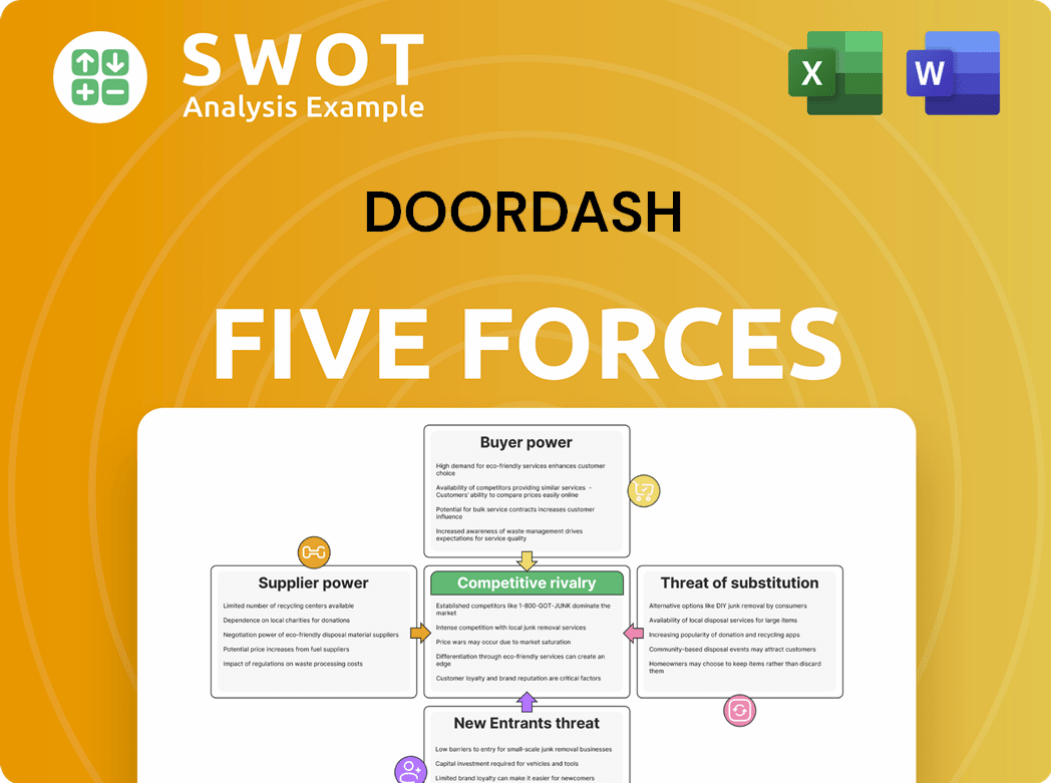
Related Blogs
- What are Mission Vision & Core Values of DoorDash Company?
- What is Competitive Landscape of DoorDash Company?
- What is Growth Strategy and Future Prospects of DoorDash Company?
- How Does DoorDash Company Work?
- What is Sales and Marketing Strategy of DoorDash Company?
- What is Brief History of DoorDash Company?
- What is Customer Demographics and Target Market of DoorDash Company?
Disclaimer
All information, articles, and product details provided on this website are for general informational and educational purposes only. We do not claim any ownership over, nor do we intend to infringe upon, any trademarks, copyrights, logos, brand names, or other intellectual property mentioned or depicted on this site. Such intellectual property remains the property of its respective owners, and any references here are made solely for identification or informational purposes, without implying any affiliation, endorsement, or partnership.
We make no representations or warranties, express or implied, regarding the accuracy, completeness, or suitability of any content or products presented. Nothing on this website should be construed as legal, tax, investment, financial, medical, or other professional advice. In addition, no part of this site—including articles or product references—constitutes a solicitation, recommendation, endorsement, advertisement, or offer to buy or sell any securities, franchises, or other financial instruments, particularly in jurisdictions where such activity would be unlawful.
All content is of a general nature and may not address the specific circumstances of any individual or entity. It is not a substitute for professional advice or services. Any actions you take based on the information provided here are strictly at your own risk. You accept full responsibility for any decisions or outcomes arising from your use of this website and agree to release us from any liability in connection with your use of, or reliance upon, the content or products found herein.